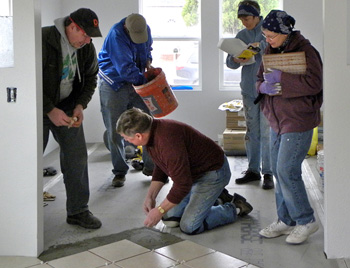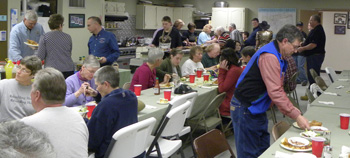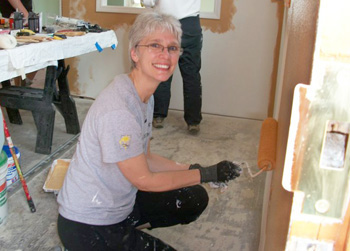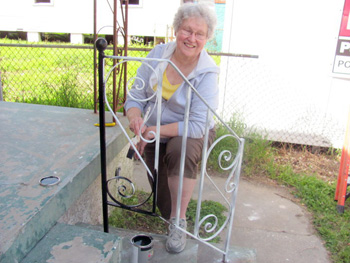| Search PNC News for stories of people and churches in our UCC Conference: |
|---|
PNC work teams restore homes five years after Hurricane Katrina
Helping with finishing work on houses in New Orleans and seeing them nearly ready to move back into gave participants in the 2010 week-long work teams from the Pacific Northwest Conference a sense of accomplishment.
Feb. 7 to 13, Randy Crowe, managing director of N-Sid-Sen, took a team of 16—aged 17 to 74. March 21 to 27, Bobbi Virta, pastor of Ferndale UCC, led a team with 13 from her church, Ruth Anne Hill from Richmond Beach UCC in Shoreline, and a man from San Francisco. April 10 to 17, Sharry Nyberg of Bellingham First Congregational UCC is taking a team from her church.
Crowe, Virta and Hill plan to lead teams next year.
 |
| February team lays floor tiles |
On their first day, the February team shared in the Sunday Super Bowl victory of the New Orleans Saints, going into the street beating church kitchen pots and pans with utensils, watching fireworks and enjoying people out and happy after so much sadness, said Tim Devine, pastor of St. Paul’s UCC in Seattle, recalling his first evening there.
It was his first time, so he appreciated orientation to post-Katrina history, what the UCC and others have done, what remains to be done with 55,000 housing units vacant, waiting to be worked on or torn down.
The team worked on two homes in the upper ninth ward, where some homes are lived in, some are in transition and some lots are empty.
Devine installed subflooring with glue and screws, then made mud for tiling and mortar to fill cracks in the foundation. While working, he thought about what to preach at St. Paul’s the next Sunday with the lectionary linking Jesus’ transfiguration and Moses on Mt. Sinai.
“It was a good message for us at the work camp: work, yes, but don’t miss out on talking with the people who have stories to share,” he said, telling about the group joining in the dedication of a house of two sisters who are grandmothers.
The house was renovated in a partnership of the UCC, Red Cross, Salvation Army and local Crescent Alliance Recovery Project, which supplied grants and volunteers. Devine also met a man from a UCC church in Des Plaines, Ill., whohad worked on the house six months ago. His church comes twice a year for work camps and happened to be there for the dedication.
“After driving past hundreds of vacant houses, it was a gift to witness the dedication. It is only one family, but it means the world to them,” he said.
Jim Spraker of Plymouth Congregational UCC in Seattle, went for his third work camp. He said that about a third of the houses damaged remain to be restored.
“It varies from neighborhood to neighborhood,” he said. “Those of lower incomes receive grants for supplies, but need volunteer labor. UCC funding runs out next year. We’ve worked five years, but there is so still much to do.”
He said one church closed, deciding to use funds it had to restore a child-care center and sacrifice its building to merge with another church.
“It’s profound to know the trauma people went through,” he said. “Sometimes people can’t do the work themselves, for lack of financial capacity or the mental ability to pull together what they need to do to rebuild their homes. We provide that resource, so they can move back into their homes.”
 |
| Little Farms UCC provides a potluck every week for teams. |
Members of the February team met Brian, a 64-year-old African-American homeowner and retired newspaper photographer. He told them his house was the only home he had known. He has been living with different relatives, and expects to move back in this summer.
He also told them that like many other homeowners, his insurance money went to the bank to pay off the mortgage and he never received any of it to pay for repairs.
Ed Philyaw, a member of St. Paul’s on his fifth work camp, said that “without the efforts of churches and individuals like Brad Pitt—who is building 150 eco-green houses—I believe nothing positive would have been accomplished,” said Philyaw, whose wife went on one trip and oldest daughter went on the last trip. “I would say these were some of the most meaningful experiences of my life.”
To those who wonder about the futility of rebuilding a city that lies below sea level in a hurricane-prone area, he asks where in this world is safe from disaster—given Mt. St. Helens’ eruption near Seattle, earthquakes in California, floods in Rhode Island and Sept. 11 in New York.
“With so much work yet to be done and so many people in need it is quite simply the right thing to do,” he asserted.
Crowe pointed out that federal funding allocated for recovery and rebuilding in 2005 has been held up, but the current administration plans to release the funds to continue assistance.
Devine found it difficult “to hear someone’s story face-to-face or even to see the damaged houses and infrastructure years later. Our fast-paced media images hold the potential to keep us from feeling real pain or even empathy. The people fill my heart—members of Little Farms UCC who supply a potluck dinner Monday evenings, members of another work team, homeowners across the street, the sisters whose home was dedicated, and other work camp volunteers from Seattle, Tacoma, Spokane and Helena who became a community of aching knees, open hearts, sincerity and laughter.”
 |
| Bobbi Virta helps paint. |
Virta, whose March trip was her fourth, still sees need to go and help people rebuild.
“I see hope and I see progress,” she said, adding that some federal stimulus funds will help rebuild the roads. “I continually hear stories and experience gratitude. A 50-member gospel choir that was rehearsing at a church gave us a standing ovation and had tears in their eyes. Our emotional connection is strong.
“To experience their hospitality and gratitude humbles and impassions me to live a life of hospitality and gratitude,” she said.
Virta has seen changes in church members who have gone. They are discerning how God wants them to live the rest of their lives.
In orientation, she tells participants, “You will be changed. I can’t say how, but I can guarantee you will be changed.”
For her it’s an honor to walk with the people.
Now she sees news of other floods and disasters, in North Dakota, New England, Haiti and Chile, and she holds real stories of people in New Orleans in her heart.
“We are now specializing in long-term recovery and may go somewhere else eventually, too. We go to New Orleans now because we trust that the UCC has set up there and that there is a structure for us,” she said.
 |
| Ruth Anne Hill helps scrape then paint a porch rail. |
Hill told of the March team scraping metal porch posts and rails, painting, hanging cabinets and putting in countertops. They finished the kitchen for a family where the woman had been using her bathroom sink as a kitchen sink.
“We put her kitchen in working order,” she said.
In another house, the team was caulking and framing windows, texturing walls and ceilings, painting a carport and scrubbing the water line off the front door.
“It’s humbling to see how they are living while the rebuilding is going on around them,” said Hill, who plans to return next year and lead a group from the Richmond Beach UCC. “It was hard work each day and we felt fulfilled leaving the worksite each day. I knew our time counted for something.”
Markus Virta, 21, had heard stories about the work teams from his mother Bobbi.
“It was hard to realize that something as tragic as the hurricane had happened as I heard stories. People were so joyful and welcoming, and so persistent in overcoming day-to-day problems,” he said.
Copyright Pacific Northwest Conference News © April 2010
